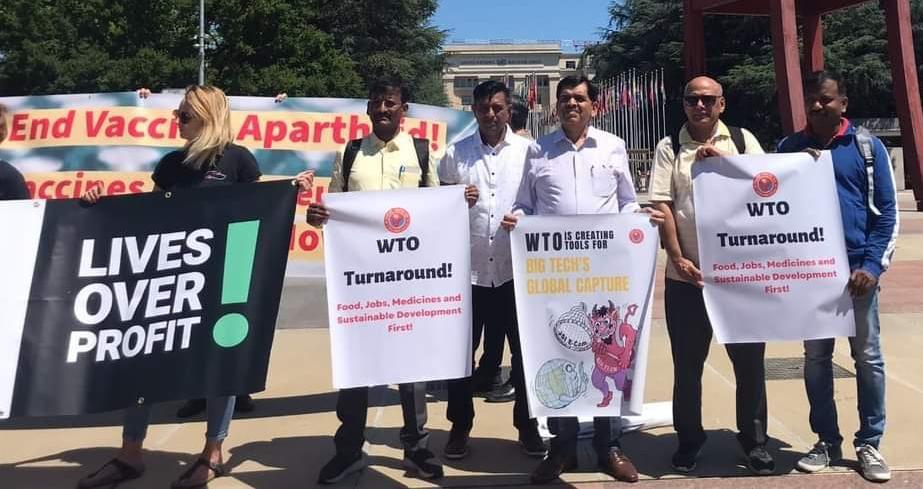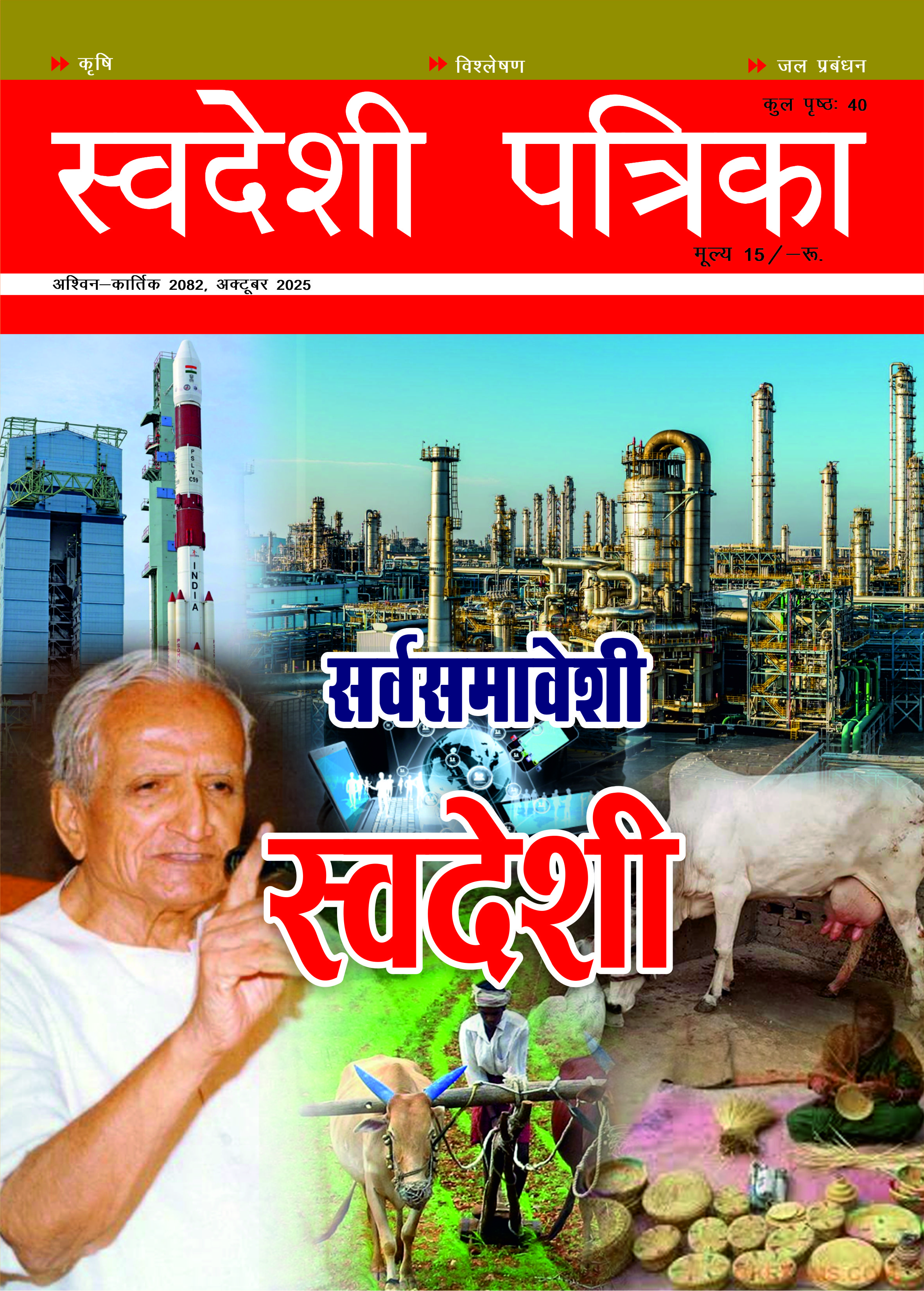
Request to Protection of interest of developing countries in proceedings at MC-12
To
The Director General
WTO, Geneva
Subject: Request to Protection of interest of developing countries in proceedings at MC-12
Respected Madam,
Through your esteemed office, we would like to draw the attention of Ministers of member Countries of WTO towards the four important issues which carries special importance for people of Least Developed Countries and developing countries. These are decisions on temporary moratorium on custom duty on electronic transmission; TRIPS waiver on vaccine, medicines, therapeutics and related technologies for treatment of COVID-19; permanent solution to Peace Clause in Agreement on Agriculture on public stockholding for food security and fisheries subsidies.
1. TRIPS WAIVER
Humanity has gone through a worst tragedy in the past two years, and people in different parts of the world are still struggling for equitable access to diagnostics, medicines, vaccine and other treatments. You will appreciate that main culprit for the same is TRIPS Agreement made in the beginning of WTO at Marrakesh. Exceptions permitted in the TRIPS Agreement on the issue of public health were ineffective as they were structured with lots of conditions which were either difficult to comply with or were impractical. Whatever small was achieved in Doha Declaration as TRIPS flexibilities has been made ineffective by developed countries, especially USA by forcing developing countries as well as the least developed countries to incorporate more restrictive conditions known as TRIPS Plus and Data Exclusivity in FTAs with them.
India, Africa Group and other supporting countries proposed a TRIPS waiver for vaccine, medicines and consumables for treatment of COVID-19 which was initially opposed totally by the developed countries including USA, EU and Japan later on atleast agreed to text based negotiations.
However, the text circulated is far from useful for the purpose enshrined in India-South Africa proposal of TRIPS waiver. It is unfortunate that the proposal on table is limited to TRIPS waiver for vaccine only and that too, limited to import and exports of the vaccine and that also with technicalities purposely designed to deny the implementation of TRIPS waiver even for vaccines. We fail to understand why the text in circulation puts so many conditionalities. Proposal to destroy the vaccines produced on expiry of term of waiver is a cruel joke on humanity. We call upon you to make use of your good offices to ensure TRIPS waiver extended to medicines, therapeutics, diagnostic, disposables and all types of equipments alongwith vaccines used in the treatment of COVID-19.
2. FOOD SECURITY AND FARMERS’ SERVIVAL
As you are aware that the WTO negotiations on agriculture remain deadlocked since Doha Declaration in 2001. The US and EU wanted an agreement not only on agriculture but also in the other areas such as non-agricultural market access and services. In 9th MC at BALI in December, 2013, a decision on public stockholding for food security purposes was taken. Members agreed to put in place an interim mechanism and to negotiate on an agreement for a permanent solution applicable to all developing countries.
After Bali, the first proposal for a permanent solution came from India alongwith other countries of the G–33 in July 2014, which essentially demanded to move public stockholding for food security into the Green Box. The proposal also called a ‘permanent solution’. Good number of years have passed since then and countries like India are still waiting for a permanent solution on food security and public stockholding to arrive at the WTO.
We have seen the importance of public stockholdings, for food security in the last two years of Corona pandemic. Poorer countries are in dire need for affordable food for survival of their population. We appreciate the proposal of Africa group, G33 and others, strongly supported by India for a permanent solution, undoing the wrong done at WTO initial agreements, when the base years was kept at 1986-88 for the purpose of calculation of agriculture subsidies.
We call upon you to use your good offices to ensure an agreement which doesn’t come in way of food security for billions of people and also undo the historical wrongs in terms of classification of subsidies. There is no justification of allowing more than $300 Billions of subsidies by US and objecting a meagre subsidies given by Indian government for food security of people.
With the COVID-19 pandemic still wreaking havoc on lives and livelihoods of small farmers, finding a permanent solution to the issue should be a priority for all in the 12th MC.
3. SAVE CONVENTIONAL FISHERIES AND POOR FISHERMEN
The mandate to discipline fisheries subsidies comes from the 2001 Doha Ministerial Conference which required to prohibit certain forms of fisheries subsidies which contribute to overfishing and overcapacity (OFOC), and eliminate subsidies that contribute to illegal, unreported and unregulated (IUU) fishing. There are wide differences between WTO Member States on many key issues, including the definition of harmful subsidies; the definition of IUU and how it may include small fishers in developing countries; scope and definitions of the different concepts, including of small fishers; and the management role of the WTO.
We strongly oppose the developed countries suggestion for an exemption for low-income, resource-poor or livelihood fishing or fishing-related activities in developing countries operating within 12 nautical miles, with a limit of 5 years for fishing in the EEZ. We call upon your good offices to safeguard the interests of our small fishermen and other fishing activities for the livelihood of our vast coastal population. There should not be any restriction on support to small fishermen. On the other hand, to safeguard the environment there is urgent need to restrict organised deep sea fishing by big corporates.
4. END MORATORIUM ON CUSTOM DUTY ON ELECTRONIC TRANSMISSION
We wish to put on record our appreciation for proposal from Government of India to end moratorium on tariff on import of e-products, which is continuing since 1998. We wish to put on record that current moratorium on custom duty on electronic transfer is against the interest of developing countries in general and India in particular. This is not only impacting job creation in electronic sector, but also the revenue generation.
Imposition of tariff on electronic transmission will be the first condition for success in fourth industrial revolution, namely, digital industrialisation by the developing countries and to block the monopoly of developed countries and digital colonisation which is already taking an ugly shape. The surging trend in digitisation of greater number of products, especially increasing percentage of 3D printing of manufactured goods is showing further losses of tariff revenue.
We urge you to use your good office to ensure end of this temporary moratorium on tariff on electronic transmission.
Kindly keep the above facts, circumstances and expected outcome of decisions on the above referred agenda during the proceedings at WTO on 12-15th June, 2022.
Thanking you.
For Swadeshi Jagran Foundation
Ashwani Mahajan
National Co-convenor
Anil Sharma
Member
S. Lingamurty
Member


